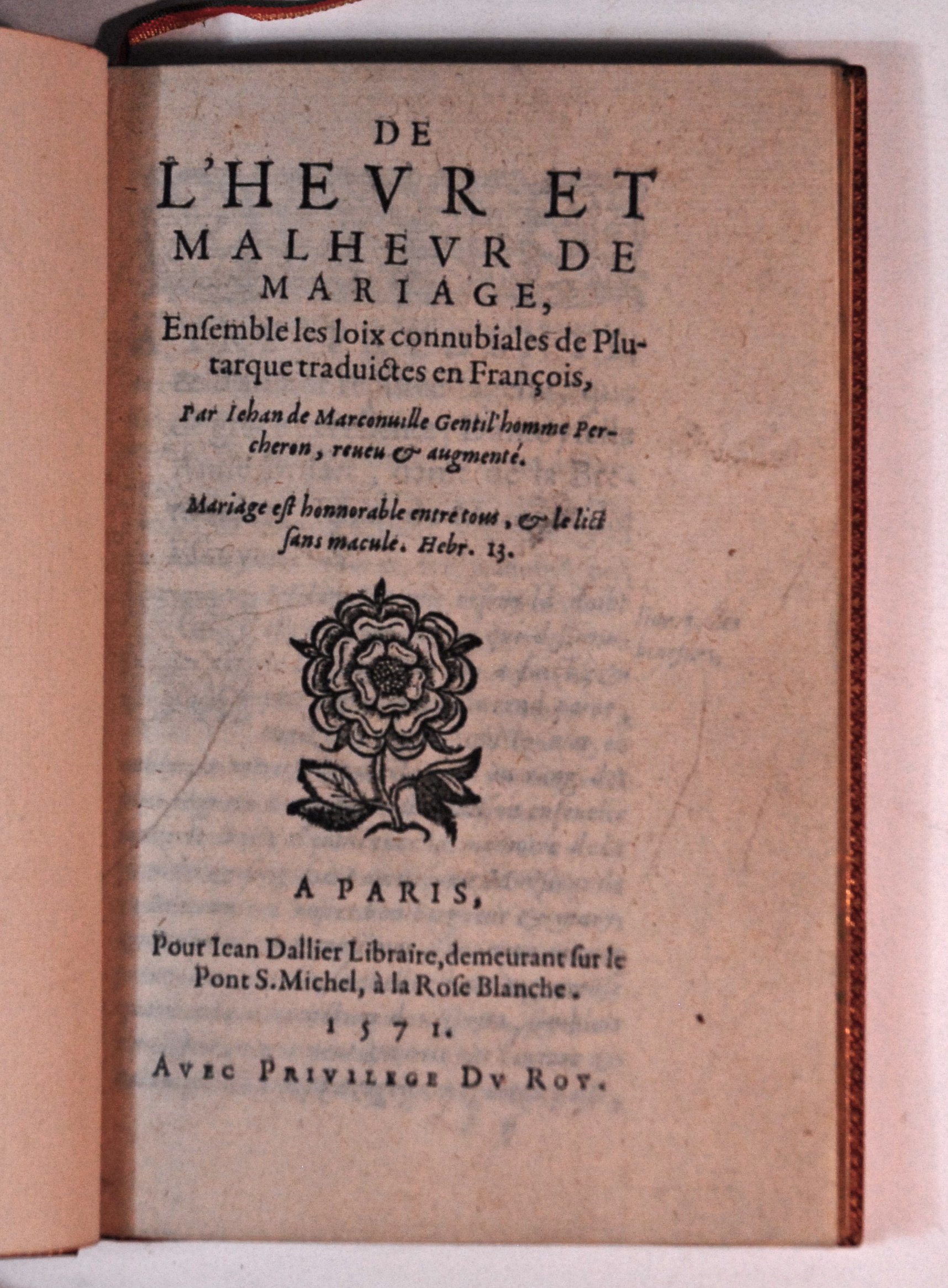MARCONVILLE, Jean de
De l'Heur et malheur de mariage, ensemble les loix connubiales de Plutarque, traduictes en françois, par Jehan de Marconville
Paris, pour Jean Dallier, 1571£1,950.00
8vo. ff. (viii) 83 (i). Roman letter, italic side notes. Woodcut publishers’ device on title-page, floriated woodcut initials and head-pieces, book plate of Charles V. D. Elst on pastedown. Light age yellowing. A very good copy in C19 French crushed red morocco ‘Jansenist’, signed Hardy-Menil, spine with raised bands, gilt title, edges with double gilt rule, inner dentelles richly gilt, a.e.g., joints slightly crushed at head.
Rare second edition of this curious work on the pros and cons of marriage, first published in Paris in 1564, concurrently with another work examining the good and evil of Women; both are mentioned in the privilege given to Jean Dallier at the end of this book and were probably complementary. Marconville published many works which presented arguments, for and against, in a tradition derived from Erasmus, and prefiguring Montaigne’s Essais. The present work addresses such things as adultery, marriage ceremonies both christian and pagan, degrees of consanguinity, how to punish a wife, jealousy and the unhappiness caused by being married to a “Mauvais Femme”.
“Some French Catholics who began cautiously endorsing marriage were Jean Bouchet, Jean de Marconville and Francois de Billon. Jean de Marconville was a Catholic who sought the unity of the Church, but objected to the use of force against the Protestants. He addressed the issue of marriage in his ‘De l’Heur et malheur de mariage’ , published in 1564. The stated premise was that men and women were meant to be married. He advocated marriage as security ‘ .. against the disordered affections of the flesh and against the vices of incontinence and sensuality.’” Yvonne Petry. ‘Gender, Kabbalah, and the Reformation.’ This was taken in part and reworked from a French translation of Mexia’s ‘Diverses Lecons’ by Claude Gruget. “Marconville conceals Mexia as a source, juggles the order of Mexia’s three linked chapters on marriage and leaves his reader with a false impression of his source material. Marconville borrowed and compiled from Mexia’s ‘Diverses Lecons’, but more importantly he changed the meaning and context of the examples. Marconville transformed Mexia’s writings on variety and diversity into an argument for monogamous Christian marriage. .. Marconville’s work .. echoes Mexia and copies his phrases, but alters them slightly to emphasise the more formal requirements of the public ceremonies required for a legitimate marriage. For Mexia, the consent alone (seul consentment) of the couple suffices, helped along by ceremonies. For Marconville a more public (solonnel) arrangement is required to demonstrate this consent that he emphasises as ‘mutual’. Lyndan Warner ‘The Ideas of Man and Woman in Renaissance France: Print, Rhetoric, and Law’
Very little is known of Marconville’s life. A country gentleman born about 1540, he was a fairly prolific writer in the popular philosophical vein and a friend of a number of better known literary contemporaries such as Thevet and Belleforest. Hofer (NBG) describes his works on women as “recherchés pour leur singularité”.
This Edn. not in BM STC Fr.. Adams M-551. Brunet III 1408. “Traités assez recherchés”. Cioranescu 14017 (1st ed.). Gay II 470. “Livre rare et tres curieux.” Not in Tchermerzine or Hull 'Chaste, silent & obedient'.In stock






